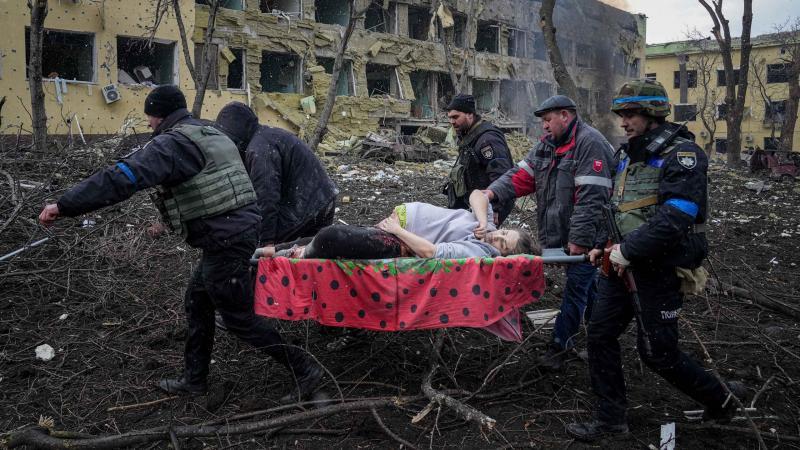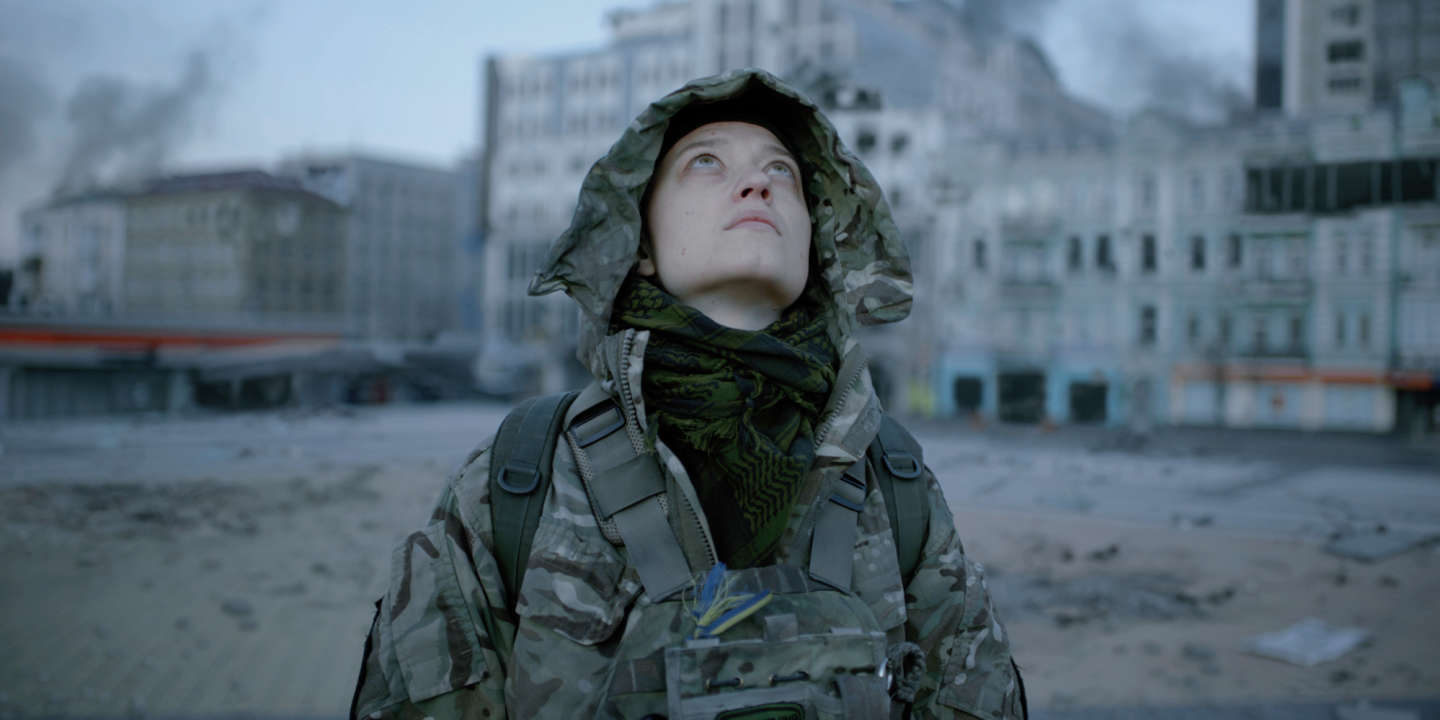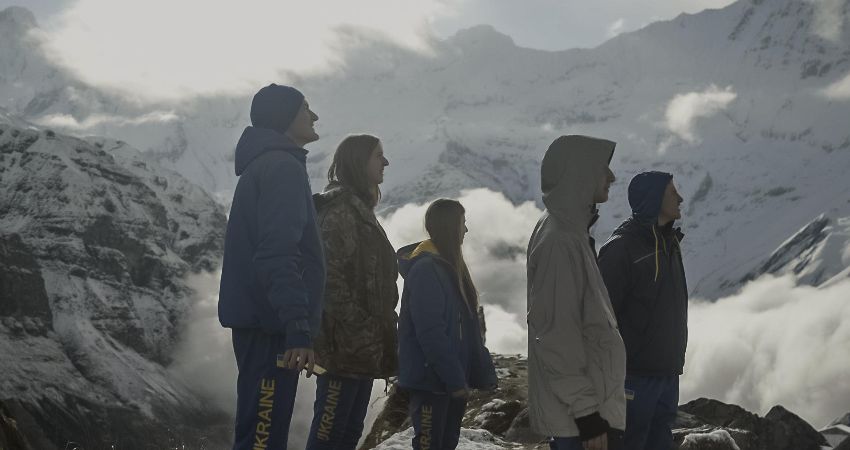Side By Side Ukrainian Film Festival, Curzon Soho - cameras of courage and resistance | reviews, news & interviews
Side By Side Ukrainian Film Festival, Curzon Soho - cameras of courage and resistance
Side By Side Ukrainian Film Festival, Curzon Soho - cameras of courage and resistance
The festival shows war-torn Ukraine in turmoil but unbowed

François Truffaut said that there is no such thing as an anti-war film because cinema inevitably glorifies the horror of conflict. The premise was robustly challenged over the weekend at the Ukrainian Institute London’s fourth annual film festival, Side By Side, which screened a handful of films, documentary and narrative, feature-length and short, that compelled the audience to reflect deeply on war’s horrific nature.
A recurring festival theme was a sense of filmmaking itself being overtaken by events in the wake of last year’s Russian invasion of Ukraine. In I Did Not Want to Make a War Film, for instance, the award-winning documentarian Nadia Parfan returns from holiday to her Kyiv apartment shortly after 24th February 2022 but soon begins to question the ethics of filming in a country under attack.
She talks of exploitation, of “war porn”, and worries that Ukrainian voices are being drowned out by the rising drumbeat of Western media coverage. Yet her brief sketch of the astonishing resilience of people in the face of violence shows that the movie camera has a part to play in the struggle against military oppression.
 The festival opened and closed with Mstyslav Chernov’s 20 Days in Mariupol, which won the World Cinema Documentary Competition at Sundance this year. It goes on UK release on 6th October.
The festival opened and closed with Mstyslav Chernov’s 20 Days in Mariupol, which won the World Cinema Documentary Competition at Sundance this year. It goes on UK release on 6th October.
Nobody could accuse Chernov of glorifying or exploiting war. He and his Associated Press colleague, Evgeniy Maloletka, were trapped in the eastern port city when it was besieged and shelled by the Russians in the early weeks of the war. A brave and innovative visual storyteller, Chernov routinely places himself in harm’s way in order to capture the human stories behind the news footage – of which, ironically, he was also the main supplier as one of few photojournalists to witness the Siege of Mariupol at first hand.
Maksym Nakonechnyi’s uncompromising debut feature, Butterfly Vision, was finished only days before Putin launched his “special military operation”. It casts a troubled eye over divisions in Ukrainian society that are often conveniently ignored by the war’s international cheerleaders. Set during an earlier phase of the conflict that began in 2014, it tells the fictional story of a drone pilot, Lilya (Rita Burkovska, pictured above), nicknamed “Butterfly”, who returns home from the Donbas after being held captive by Russian separatists.
 The cinematographer Khrystyna Lyzohub presents Lilya’s reunion with her family in the format of a news bulletin, with emojis and online comments flashing across the screen. She is championed for her heroism. But we get the impression that neither her doting mother (Myroslava Vytrykhovska-Makar) nor her sullen husband Tokha (Lyubomyr Valivots), who joins a far-right vigilante group that attacks the Roma community, really wants to know that Lilya was raped by her torturers and has become pregnant. We see her physical scars and later glimpses of traumatic flashbacks alongside satellite targeting imagery and pixellated video clips that seem to internalise a hybrid war. In one of the most disturbing scenes Lilya is thrown off a bus because the driver refuses to accept her veteran’s free travel card. “It’s not my war,“ he shouts.
The cinematographer Khrystyna Lyzohub presents Lilya’s reunion with her family in the format of a news bulletin, with emojis and online comments flashing across the screen. She is championed for her heroism. But we get the impression that neither her doting mother (Myroslava Vytrykhovska-Makar) nor her sullen husband Tokha (Lyubomyr Valivots), who joins a far-right vigilante group that attacks the Roma community, really wants to know that Lilya was raped by her torturers and has become pregnant. We see her physical scars and later glimpses of traumatic flashbacks alongside satellite targeting imagery and pixellated video clips that seem to internalise a hybrid war. In one of the most disturbing scenes Lilya is thrown off a bus because the driver refuses to accept her veteran’s free travel card. “It’s not my war,“ he shouts.
Nakonechnyi co-wrote the screenplay for Butterfly Vision with Iryna Tsilyk, whose debut feature as a director, Rock Paper Grenade, was also screened at the festival. A poignant coming-of-age tale set in the early decades of post-Soviet Ukraine, the film is based on an autobiographical novel, Who You Are, by Tsilyk’s husband Artem Chekh, and is unusual in the way it uses gentle comedy to address painful and often violent episodes in the country’s past.
The movie’s protagonist Timophiy is shown first as a child (Andriy Cherednyk, pictured above) but soon grows into a teenager (Vladyslav Baliuk) who forges a bond with his grandmother’s boyfriend, an Afghan war veteran and drunkard called Felix (Yuriy Izdryk), as he navigates the ambiguous space between adolescence and adulthood. Rock Paper Grenade is a tragicomic film about the fall of communism with a marvellous central performance by Baliuk.
 The double impact of war on the lives of young people, destroying not only the present but also threatening to ravage their futures, is the subject of the documentary We Will Not Fade Away directed by Alisa Kovalenko.
The double impact of war on the lives of young people, destroying not only the present but also threatening to ravage their futures, is the subject of the documentary We Will Not Fade Away directed by Alisa Kovalenko.
Set in the eastern Luhansk region shortly before last year’s Russian invasion, the film chronicles the lives of five teenagers (pictured above) whose refusal to abandon their hopes and dreams in the midst of gunfire is rewarded when they get an unexpected invitation to go on a trip to the Himalayas. The cinematography by Kovalenko herself and Serhiy Stetsenko conveys the dark clouds hanging over the Donbas and sunlight over a Nepalese mountain with striking beauty.
more Film
 theartsdesk Q&A: Marco Bellocchio - the last maestro
Italian cinema's vigorous grand old man discusses Kidnapped, conversion, anarchy and faith in cinema
theartsdesk Q&A: Marco Bellocchio - the last maestro
Italian cinema's vigorous grand old man discusses Kidnapped, conversion, anarchy and faith in cinema
 I.S.S. review - sci-fi with a sting in the tail
The imperilled space station isn't the worst place to be
I.S.S. review - sci-fi with a sting in the tail
The imperilled space station isn't the worst place to be
 That They May Face The Rising Sun review - lyrical adaptation of John McGahern's novel
Pat Collins extracts the magic of country life in the west of Ireland in his third feature film
That They May Face The Rising Sun review - lyrical adaptation of John McGahern's novel
Pat Collins extracts the magic of country life in the west of Ireland in his third feature film
 Stephen review - a breathtakingly good first feature by a multi-media artist
Melanie Manchot's debut is strikingly intelligent and compelling
Stephen review - a breathtakingly good first feature by a multi-media artist
Melanie Manchot's debut is strikingly intelligent and compelling
 DVD/Blu-Ray: Priscilla
The disc extras smartly contextualise Sofia Coppola's eighth feature
DVD/Blu-Ray: Priscilla
The disc extras smartly contextualise Sofia Coppola's eighth feature
 Fantastic Machine review - photography's story from one camera to 45 billion
Love it or hate it, the photographic image has ensnared us all
Fantastic Machine review - photography's story from one camera to 45 billion
Love it or hate it, the photographic image has ensnared us all
 All You Need Is Death review - a future folk horror classic
Irish folkies seek a cursed ancient song in Paul Duane's impressive fiction debut
All You Need Is Death review - a future folk horror classic
Irish folkies seek a cursed ancient song in Paul Duane's impressive fiction debut
 If Only I Could Hibernate review - kids in grinding poverty in Ulaanbaatar
Mongolian director Zoljargal Purevdash's compelling debut
If Only I Could Hibernate review - kids in grinding poverty in Ulaanbaatar
Mongolian director Zoljargal Purevdash's compelling debut
 The Book of Clarence review - larky jaunt through biblical epic territory
LaKeith Stanfield is impressively watchable as the Messiah's near-neighbour
The Book of Clarence review - larky jaunt through biblical epic territory
LaKeith Stanfield is impressively watchable as the Messiah's near-neighbour
 Back to Black review - rock biopic with a loving but soft touch
Marisa Abela evokes the genius of Amy Winehouse, with a few warts minimised
Back to Black review - rock biopic with a loving but soft touch
Marisa Abela evokes the genius of Amy Winehouse, with a few warts minimised
 Civil War review - God help America
A horrifying State of the Union address from Alex Garland
Civil War review - God help America
A horrifying State of the Union address from Alex Garland
 The Teachers' Lounge - teacher-pupil relationships under the microscope
Thoughtful, painful meditation on status, crime, and power
The Teachers' Lounge - teacher-pupil relationships under the microscope
Thoughtful, painful meditation on status, crime, and power

Add comment